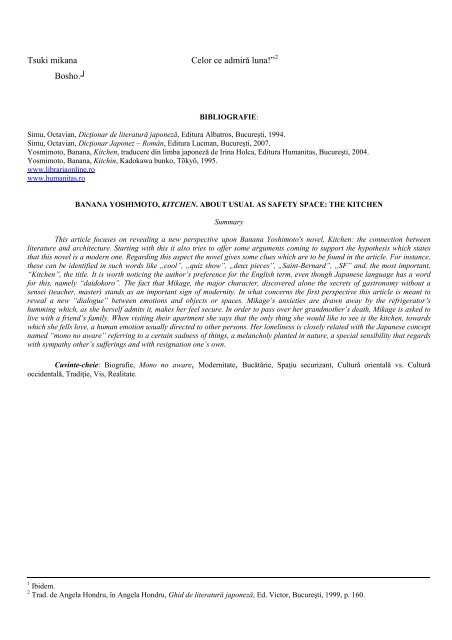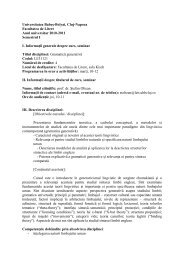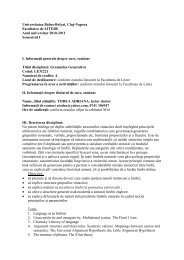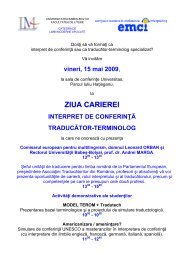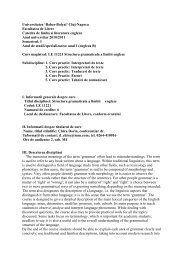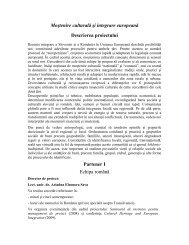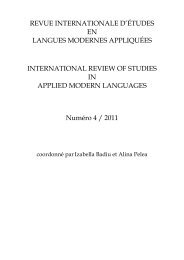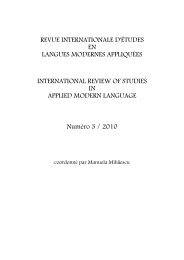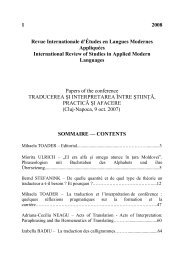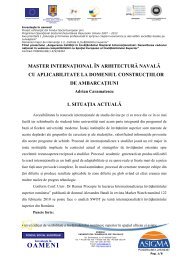Dimensiuni ale limbajului n context carceral
Dimensiuni ale limbajului n context carceral
Dimensiuni ale limbajului n context carceral
You also want an ePaper? Increase the reach of your titles
YUMPU automatically turns print PDFs into web optimized ePapers that Google loves.
Tsuki mikana Celor ce admiră luna!” 2<br />
Bosho.┘<br />
BIBLIOGRAFIE:<br />
Simu, Octavian, Dicţionar de literatură japoneză, Editura Albatros, Bucureşti, 1994.<br />
Simu, Octavian, Dicţionar Japonez – Român, Editura Lucman, Bucureşti, 2007.<br />
Yosmimoto, Banana, Kitchen, traducere din limba japoneză de Irina Holca, Editura Humanitas, Bucureşti, 2004.<br />
Yosmimoto, Banana, Kitchin, Kadokawa bunko, Tōkyō, 1995.<br />
www.librariaonline.ro<br />
www.humanitas.ro<br />
BANANA YOSHIMOTO, KITCHEN. ABOUT USUAL AS SAFETY SPACE: THE KITCHEN<br />
Summary<br />
This article focuses on revealing a new perspective upon Banana Yoshimoto's novel, Kitchen: the connection between<br />
literature and architecture. Starting with this it also tries to offer some arguments coming to support the hypothesis which states<br />
that this novel is a modern one. Regarding this aspect the novel gives some clues which are to be found in the article. For instance,<br />
these can be identified in such words like „cool”, „quiz show”, „deux pieces”, „Saint-Bernard”, „SF” and, the most important,<br />
“Kitchen”, the title. It is worth noticing the author’s preference for the English term, even though Japanese language has a word<br />
for this, namely “daidokoro”. The fact that Mikage, the major character, discovered alone the secrets of gastronomy without a<br />
sensei (teacher, master) stands as an important sign of modernity. In what concerns the first perspective this article is meant to<br />
reveal a new “dialogue” between emotions and objects or spaces. Mikage’s anxieties are drawn away by the refrigerator’s<br />
humming which, as she herself admits it, makes her feel secure. In order to pass over her grandmother’s death, Mikage is asked to<br />
live with a friend’s family. When visiting their apartment she says that the only thing she would like to see is the kitchen, towards<br />
which she fells love, a human emotion usually directed to other persons. Her loneliness is closely related with the Japanese concept<br />
named “mono no aware” referring to a certain sadness of things, a melancholy planted in nature, a special sensibility that regards<br />
with sympathy other’s sufferings and with resignation one’s own.<br />
Cuvinte-cheie: Biografie, Mono no aware, Modernitate, Bucătărie, Spaţiu securizant, Cultură orientală vs. Cultură<br />
occidentală, Tradiţie, Vis, Realitate.<br />
1 Ibidem.<br />
2 Trad. de Angela Hondru, în Angela Hondru, Ghid de literatură japoneză, Ed. Victor, Bucureşti, 1999, p. 160.


